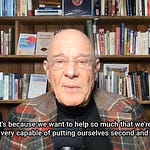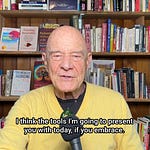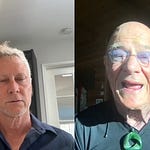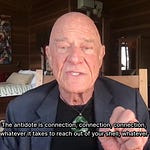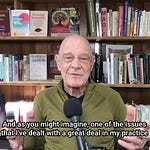Our planet is in crisis. As environmental destruction and social inequity persist, it's clear our current systems have failed. But in uncertain times, we can find hope envisioning a just, sustainable future—and the tools emerging to build it.
This week, I spoke with Tony Lai, a fellow at the Stanford Center for Legal Informatics, about the “revolution in values” taking place in small pockets across the globe.
Tony’s work explores how we can shape our laws and technologies to promote values enabling both human and ecological well-being.
We discussed the “rights of nature” movement, which seeks to shift views from thinking of nature as property to nature as a living entity. The movement aims to make nature's value ‘legible’ within legal and economic systems that have long treated nature as a resource to extract for productivity and growth.
“We’re telling ourselves a new story about how we coordinate with nature.” – Tony Lai
Places like New Zealand have granted personhood and rights to forests and mountains, and similar shifts are happening everywhere as communities recognize nature’s intrinsic worth.
The revolution in value is calling us to step into unknown territory, with more life-affirming tools, economies and governance systems to create the world we imagine. Stepping into the unknown can be frightening, but it is where progress begins. As old systems unravel, we must have courage to explore new paths towards justice, sustainability and shared well-being.
“This isn't about nature but saving us and our relationship with it,” Tony told me.
We also discussed Bhutan’s Gross National Happiness index, measuring well-being across nine life domains, not just economics or GDP. What began as a country-level initiative can be adapted for communities or families, as one of Tony’s friends did in developing her own “gross family happiness” index with her children.
Tony has lived in San Francisco’s Embassy Network, an intentional community experimenting with governance systems and learning to live sustainably in shared spaces.
“We spent six months trying six systems, from dictatorship to democracy,” Tony told me. “It’s about walking the talk.”
Intentional communities can model new social systems and technologies promoting well-being, connection and regenerative design. Meanwhile, artificial – or as I call it, creative intelligence – is making leaps and bounds that promise to revolutionize our understanding of ourselves and nature.
Join Tony and I, as we chart a course for progress guided not by profits alone, but by care, ethics and a vision of flourishing for all.
Will you join the revolution?
Golden light,
Dr. Richard L. Miller
Key Takeaways:
How Tony Lai came to discover the beauty of exploring the relationship with the unknown, both internally and with others.
The importance of recognizing the beauty of diversity within the concept of "We Are One."
The rights of nature coalition seeks to recognize legal rights for ecosystems and other elements of nature, and its main goal is to shift our perspective from viewing nature as property or resources to recognizing it as a living entity with inherent rights.
The concept of Gross National Happiness takes into account factors such as psychological well-being, cultural diversity, environmental sustainability, and good governance, and it seeks to create policies and programs that promote overall happiness and well-being, rather than just material prosperity.
The challenge of balancing the social Darwinist and social humanist aspects within ourselves and identifying these aspects in others
Stepping into the unknown together and the hope to provide some pathway or reflection on what it is like to step into the unknown together.
Links and references:
Transcript
Welcome to Mind Body Health and Politics. I'm your host, Dr. Richard Louis Miller. The mission of Mind Body Health and Politics is to enhance your physical and emotional well-being and to encourage community. I believe that community is essential for our well-being because human beings are basically friendly tribal animals who enjoy collaborating and cooperating. We enjoy doing all kinds of things together, from sewing circles to poker games to playing ball games together to watching things together. One thing we really love doing together as tribal animals is eating together. We like each other.
However, there is a small percentage of individuals who seek to dominate others. This has been the case since the dawn of civilization, with those who were physically strong becoming tribal chieftains and kings. We overthrew them centuries ago, but we must remain vigilant to prevent losing our hard-won democracy and republic. We must stay politically aware and vote, even during difficult economic times. As Thomas Jefferson said, "eternal vigilance is the price of liberty.”
Today, we have Tony Lai, the research director at Mother Tree Labs and a fellow at the Stanford Center for Legal Informatics.
Stepping into the unknown.
Toni Lai 4:38
Thank you so much, Richard. It's a pleasure to be here.
Dr. Richard Miller 4:42
Tony, if I gave you a magic wand, what would you wish for to come out of this interview? I am committed to supporting your mission and collaborating with you in any way I can.
Toni Lai 5:08
There are many layers to how we come to know things, and many ways in which we step into the unknown. If I were to wave a magic wand, I would hope that we might help provide some pathway or reflection on what it is like to step into the unknown together.
Dr. Richard Miller 5:57
Tony, what does "the unknown" mean to you? Tell me what resonates in your consciousness when you think about it.
Toni Lai 2 6:16
I have been very fortunate over the last few weeks, months, and years to have had space and guidance from new and old friends in the practices of ancestral and new wisdoms, technologies, and approaches for how we step into a space where not everything is certain, and where things are changing. It is a space where we are willing to accept some of the mystery of a situation.
I was reading about some of the notions of the Great Mystery, which is, as I understand, part of many Native American traditions and the source of many of the creative impulses and energies that we feel and see. It is also said to imbue everything in the universe. I think that as we lean into all the different axes of knowing and understanding, from the scientific perspective of quantum physics to constantly seeking to understand more about the way that the physical world works, we are starting to understand that concepts like entanglement, superposition, and probability are all aspects of a new way of knowing that is less fixed and Cartesian in structure than we might have once imagined.
I have personally found joy in exploring this relationship with the unknown, both internally and with others. Music has also been a wonderful pathway for exploring that. Yes, I find joy and delight in it.
The Story of Interbeing
Dr. Richard Miller 8:21
I am aware that you are a magnificent violin player, and I've had the privilege of being in your presence when you perform.
Can you tell us about your research at Mother Tree? Do you conduct any research into the unknown there? If so, could you discuss it?
Toni Lai 8:38
Well, the Mother Tree Labs is a nonprofit educational initiative that I started with Susanna Eichler. She's a storyteller, filmmaker, and a creative through and through. My background is more focused on research. My formal education was in history, so stories were always present. I then went into law and later moved to Silicon Valley, where I built technology to improve access to justice and help with some of the challenges in the legal system. From there, I started exploring the intersection between law and technology. These are two systems that create protections against predators, but at the same time, they can also become tools for those predators in various ways.
Mother Tree Labs seeks to take this intersection between law, technology, and storytelling to retell the story of interbeing and the old and emerging stories, systems, and entities that help us transform towards equity and planetary health. This is something I've been drawn to and called into, and there's a pathway into the unknown. The hope is that by documenting and sharing our learning journey, we can gather others alongside us as we try to make sense of the many changes around us.
Dr. Richard Miller 10:29
Let's deconstruct some of what you're saying so that our listeners can have a clearer understanding. When you mention storytelling, are you referring to stories from history or made-up stories? What types of stories are you bringing into play to gain a better understanding of the topic at hand?
Toni Lai 11:00
You started this radio podcast telling the story of democracy and republics. These are the stories that underlie the reason why things have legitimacy, why we believe the things we believe, and why we behave the way we do as individuals and collectives.
These stories can be embedded on a psychological, structural, systematic, technological, and legal level. The approach to finding consistency between our internal and collective feelings and the technological and legal structures is crucial to building a new future. If we continue along the path of a surveillance state with laws against protest, fear-mongering, and anti-immigrant rhetoric, we risk creating a dystopian society.
We need to steer away from these paths and towards local communities that thrive and flourish in harmony with nature and each other. The stories we tell each other have the power to shape our reality. We need to unlearn and learn together how these stories play out in the hard structures of law and technology that frame our digital interactions. We need to embed the stories of relationality and sacredness in our transactions and interactions. We are called to the challenge and coherence of the planetary crisis and the poly crisis. Climate, politics, freedom, and the stories we tell one another require individual, community, collective, local, state, national, and international action. There are many wonderful story weavers like Martin Weinstein, who you had on your show previously, weaving different kinds of stories at the global, national, community, climate, and planetary health level. We need to weave these stories together to create a better future.
Where we are all one.
Dr. Richard Miller 14:54
As you were speaking, I noticed you used the phrase "we are one" multiple times. This phrase reveals a belief system, either political or socio-cultural. I consider myself a social humanist, one who believes in this ideology. Social humanists differ from social Darwinists, who believe in the "king of the hill" mentality and that those at the top deserve to stay there. Social humanists believe in abundance on the planet and that we can provide for everyone with food, shelter, warmth, medical care, and education. I observe these two groups vying for superiority and wonder which one will rule the planet or if there will be a combination of the two. What are your thoughts on this?
Tony Lai 16:36
Thank you for categorizing with such beautiful words. Social Darwinism has a particular resonance for me, having studied history and the early 20th century movements that were taking up space in the minds of many people around the world as part of the first wave of modernity. Modernity was all about notions of progress and outcompeting other races or nations as part of a race to be first and survival of the fittest. That was a very strong narrative, and I think it still holds true for many people.
At the same time, I want to draw a distinction that I've invited myself into, and been invited by others to consider, which is that these labels and categorizations apply to the actions and behaviors that happen in different contexts. Speaking for myself, I've been on a journey lately, learning with the help of friends and people who have more experience in this. We carry many different parts inside of ourselves, and in some sense, there's a colonizer and colonized within us all. An ancestor of all of us has been on the receiving or giving end of some version of social Darwinism and social humanism.
I have been the angry justice warrior who wants to fight, but I've also been trying to give greater voice to the caregiver listener, the one who makes space, the one who is a social humanist and doesn't see things as a zero-sum game. In terms of how we look to the future of these concepts, categories, and egos, we might give power to as collective manifestations of thought, recognizing that we all have aspects of those inside of ourselves, we have the choice to surround ourselves with people who are manifesting more of one or the other. We are on a path, and the transition is going to be about knowing that we are holding those two things in balance within ourselves at all times.
What does it mean to recognize that maybe the social Darwinist side was just trying to protect us, just trying to protect the inner circle? In some sense, there are aspects of that version of the philosophy that are about safety, security, and protection, that are about the fear of somebody coming and taking what's yours and you needing to exert your property on your boundaries.
The other version is the caregiver and the compassionate one who holds space and believes that there is good and light in everybody. I have felt those two different versions of myself in so many different situations, and the choice to see one or the other version of that ego, that categorization, or humanity in somebody that you're interacting with, I think that's the choice that we each make every time that we meet with someone.
Some of the greatest peacemakers in the world, like Nelson Mandela, met with generals who had been slaughtering thousands of his fellow movement builders, and sat down and poured them tea. That willingness to identify with that social humanist is open to every single one of us, and knowing that is going to be a shared space in society and in each of us, but that we are each on a path and that we can work with each other and help each other when we fail, and we are going to fail, we're going to be angry, and we're going to want to react in revenge. Caring for that part of ourselves as well is part of the challenge, part of the learning journey that, I think, when we speak about saving the Amazon or saving the Earth, is as much about saving ourselves and allowing the Earth to save us.
Achieving Planetary Consciousness
Dr. Richard Miller 21:05
Tony, while most of the world believes in the concept of countries with borders, there's really no such thing. This idea has been ingrained in us since ancient times, but in reality, creating these arbitrary borders merely gives the leader within that perimeter power over the people in that landmass, and divides them from those right next door. However, if we simply go into space and look down, we can see that it's one planet, not a bunch of countries with arbitrary lines. There are landmasses and water masses, but no natural borders between countries. The story of dominance and self-protection that has been told for so long is the opposite of goodwill and sharing, and it's time for a different story. We need to be more inclusive and recognize that we are all one.
Tony Lai 23:08
The beautiful space one can hold. When one thinks about the notion of "We Are One," one has to recognize the beauty of the diversity within that concept.
And within that notion, there are some beautiful storytellers, activists, and academics who are writing about the Pluribus and the plural versus this idea, this idea, and this manifestation of an abundance of ways in which we might seek to belong together in thriving, flourishing ways without seeking to control the other world.We can opt-in to communal groupings that align with the kinds of values and cultures that we want to perpetuate and be a part of.
This kind of flourishing doesn't necessarily depend on the same kind of economic development metrics of gross domestic production but might be more framed around notions of the good life when "vivia" or ideas of gross national happiness. Again, these are all ways of framing what it means to come together and strive for something together.
And I think one of the beautiful spaces we're in, in this day and age, is that we're starting to look at ways in which people can come together in forms that actually don't undermine these traditional structures, but they can operate in parallel. They can give space beyond a homogenizing single, controlling superstructure state.
A state can sort of open itself into being the nurturer of a flourishing diverse garden of many different kinds of communities and spaces that can interact. And as a state, a country, or whatever the kind of overarching entity, you know, you can say the EU as a super state or some agreement between bioregions that crosses between traditional country boundaries, rights of nature coalitions that span from the Amazon to New Zealand, like these kinds of different sorts of ways of assigning and seeing identity, allowing those values and cultural exchange frameworks to be the core of who you are. I think these can operate alongside countries.
And as we see the different versions of countries play out, and we see people hopefully with the continued opportunity to move and go to where they feel safe or able to be free, I think these are all avenues that we need to keep open as we again witness this movement into the unknown.Because I don't think anybody really knows what's going to be happening with countries. They have the last letter since the Treaty of Westphalia in the 17th century.
And they were formed on the basis, as you say, of those who would claim divine rights rule as subjects for people within their boundaries. And I think there have been revolutions and there have been evolutions of the notion of what is true and just in terms of what a country represents, in terms of potentially serving the public good or serving the nurturing of a commons that is available to everybody that speaks to upholding international norms and these things that go beyond countries beyond the can of national jurisdictions to global arms controls or, and obviously, the big one is climate and the biodiversity loss that's led to 90% of our plants and animals being decimated over the last few decades.
And so these kinds of supranational and subnational coalitions, I think, are going to be the future of the web of belonging and action and listening and storytelling and weaving of ontologies that hopefully can provide a more legitimate, fair, equitable framework for our future together beyond just that provided by countries.
Rights of nature coalition
Dr. Richard Miller 27:24
There were many interesting things you said, but two things stood out to me: the rights of nature coalition and the concept of gross national happiness.
Regarding the rights of nature coalition, it is a movement that seeks to recognize legal rights for ecosystems and other elements of nature. Its main goal is to shift our perspective from viewing nature as property or resources to recognizing it as a living entity with inherent rights.
As for gross national happiness, it is a concept that was introduced in Bhutan to measure the country's progress and well-being beyond just economic growth. It takes into account factors such as psychological well-being, cultural diversity, environmental sustainability, and good governance. The idea is to create policies and programs that promote overall happiness and well-being, rather than just material prosperity.
Tony Lai 27:49
So yeah, maybe I could provide some general context for the two concepts because they are closely related. "Rights of nature" is a concept that pertains to the legal system that we have created. As humans, it's a story that we are telling ourselves, and it's about how we cooperate and coordinate as humans, but also in relation to the planet and the environment around us.
Unfortunately, most of the systems of economics and law that we've had operating and coordinating us thus far have seen nature as a resource to be extracted, killed, and turned into something "productive". That's where GDP comes from. It comes from our labor, plus the extraction from nature, and doesn't take into account the actual inherent value of living nature to so many different contexts, whether it's water, our general health in terms of being in nature, or many other things that you've touched on in your previous episodes that speak to the value of nature that has been destroyed.
But that doesn't get brought within our legibility frameworks, such as the legal framework. I'll speak to the economic framework separately, but the "rights of nature" movement is generally an attempt to shape our laws so that the kinds of relationships that we do want to encourage in relation to enabling nature to flourish and thrive and ourselves to thrive in relation to that nature, how that set of values is legible, is made legible to the legal system.
That's actually what giving agency means when we talk about agency and giving agency or personhood to somebody, whether it's a woman, a person of color, or an ecological being. There are stages of legibility that we have given within the legal system to the activities and realities of that specific person that we're dealing with to give legibility to. This is somewhat of an arrogant approach, and I want to give a huge amount of respect to all the people who've been working in that "rights of nature" framework.
I also want to speak to the fact that many people know that nature will be just fine. At the end of the day, this is not about nature per se, but about saving us and our relationship with nature. So, at the end of the day, this is about how we manage humans, rather than how we manage nature, how we manage humans in terms of our interactions with nature.
This is starting to happen on so many different levels. In New Zealand, they've given a forest and a mountain personhood that gives specific relational weight to some of the actions that we might now take together with regards to those pieces of nature. But even here in the United States, there are local municipalities that have voted overwhelmingly, over 90% from the left and the right across political spectrums in Florida, for giving waterways specific rights so that water can remain pure, and so that the development that's happening that runs right over these traditional ecological entities gets held up and doesn't happen in the same way. That is communities coming together.
Now, when we think about these alternative ways of seeing, these alternative ways of knowing, I think "Gross National Happiness" is a beautiful example of a country deciding that it wants to see and know and find ways of creating systems that see and know and create the behaviors that enable the recognition and acknowledgement of things that bring happiness, things that bring a good life. I think this is much more central to the ways that we have lived in many different societies for many generations.
The Western European history of property and law, and creating separation and control over rather than symbiosis with, I think that system is a relatively new system that has come to dominate over the last four or five hundred years. But deeper down within our human societal wisdoms in various different cultures around the world, there are social systems that are not based around property that were communal, that had much more fundamental values that were based around communal thriving and flourishing.
I think the realignment around some of these on a local level, on a community level, where we get to opt in to creating a sense of boundaries, where the territorializing logics of late-stage capitalism are kept at bay, and we're forming a boundary where inside that boundary, we can have a logical and emotional and spiritual system that values our happiness, thriving, and flourishing into being. That's within reach. The stories are cohering and coalescing, and we're starting to be able to embed and in view some of the open-source technologies of law and governance and into action transaction.
Again, this is taking things in another direction, but I think at the core, in response to your question around "rights of nature" and "Gross National Happiness", these are, in a sense, different ways that we're seeking to align our legal and economic systems with alternative values, different kinds of value dimensions that may have been invisible, but we want to bring to the fore again, like compassion and care and domestic labor, household family interactions that actually bring so much to so many people.
The only saving grace of humanity.
Dr. Richard Miller 34:33
I appreciate your optimism and your hopeful outlook. However, I have been contemplating how our species has failed in many ways. Our history is filled with warfare and environmental destruction. We continue to kill each other and harm the planet. The only saving grace, from my perspective, is our ability to become immortal by downloading our information and consciousness onto a chip and placing it in robots. I recently spoke with Andres Gomez Emilsson from the company Qualia, which is working on measuring consciousness and developing ways to achieve this goal. While some may view this as negative, I see it as an evolutionary step forward.
Your positive outlook inspires hope that we can address major global issues such as climate change and improve overall happiness. I was particularly intrigued by your mention of New Zealand's recognition of mountains and forests as having personhood. It's a sharp contrast to the United States, which has granted personhood to corporations.
Tony Lai 37:36
My point was that I think this is starting to happen everywhere. And that's the reason for hope: we have had this revolution called the Internet, which has been a revolution in communications. Ultimately, it means that we can be sitting far from each other and having this conversation while looking at each other's smiles.
Dr. Richard Miller 37:59
You could be sitting at Wilbur Hot Springs, recently having come out of the water, and I could be sitting in my office in Fort Bragg. Yet, we could be talking as if we were right next to each other.
The revolution in value and gross national happiness.
Tony Lai 38:11
Exactly. And that is miraculous in itself. Yet, we are just beginning the series of miraculous transformations that will enable the revolution in value and the revolution in values.
When we talk about gross national happiness and the rights of nature, we are talking about the coming together of systems such as legibility, law, technology, and finance. We think about the possibilities that are coming online around regenerative finance, regenerative law, and regenerative approaches to how we coordinate and organize. These will come across communities, nations, countries, and places everywhere in the same way as the internet, Zoom, and all of these things have. They will be fundamentally woven into our daily lives so that we can value the things we want to value and bring back mutual respect, distributed benefits, social humanity, ecological awareness, and agency. All of these things that we might want to nurture in a community can be brought back because those pieces are being built out as we speak, in the open as open-source technology, as open-source infrastructure for us all to use.
For me, that is the piece that I hold on to, and it's far from the idea of downloading our consciousness. It's actually about how we interact and find each other, how we are able to translate not just our languages but our whole worldviews. In some sense, that is what a lot of this AI can be about. It helps someone who doesn't speak English as their first language to interact, someone who doesn't speak code as their first language to code, and someone who hasn't been brought up in an indigenous worldview suddenly gives them a diplomatic framework to understand an entirely different ontology and actually sink into a way of truly understanding potentially.
Again, this is just one conversation around the potential of AI and large language learning models that we've been having over the last few days in terms of what it might mean for greater understanding among peoples. These levels of interoperability between people in terms of our aspirations, our hopes, and the ways that we want to bring about these common goals are coming online right now. We're seeing the weaving of those.
Part of my work right now is to follow that research. With Susanna and others, through this current instantiation of a lab, we're trying to tell the story and make that as available as possible to everybody because it's very exciting.
Dr. Richard Miller 41:08
Before I respond to what you said, I want to take a quick sidebar. I'm changing the name of artificial intelligence. I don't like it because there's nothing artificial about it. The word "artificial" has negative connotations in our culture, suggesting something that's phony or false. Instead, I'm using the term "creative intelligence" or "C.I." for short, because we created this intelligence. Maybe you'll join me in this endeavor.
Now, getting back to the topic, I want to comment on Gross National Happiness. For those who aren't familiar, my understanding is that Bhutan has a Gross National Happiness czar who makes decisions based on how many people will derive happiness from a particular endeavor, rather than just focusing on the bottom line of money. Do you have a different understanding?
Tony Lai 42:29
Yeah, my understanding is that they have a process to come to a sort of summary, but it's broken down into nine domains. The first will be, I think, very dear to us: psychological well-being, then health, education, time use, cultural diversity and resilience, good governance, community vitality, ecological diversity and resilience, and living standards. So these are the nine domains that make up their index. And again, this is what they chose through their own processes.
But if you don't mind, I want to take this in a slightly different direction. Because, yes, it's a fascinating concept as a whole. And yet, the invitation to be creative around this was something that I think was not necessarily obvious to each of us as individuals. Like, this happens on a country level, what can I do? Maybe I can lobby for this to be brought in, in some way, at the country level.
What I think I didn't realize, and maybe most people didn't realize, was that there are ways of taking these concepts and making them your own. And I heard from a dear friend of mine, Arya, about how she took this Gross National Happiness Index and made it a thing within her own family. She had her seven-year-old and ten-year-old children, along with her husband, around the kitchen table. And they decided together what gross family happiness meant for them as a family.
And this, for me, is so revolutionary, because so many situations I know of where the cultural grounding is that a child basically listens to what their parents tell them, and they don't really have any say. But I think we're seeing this more and more, maybe this is again, some movement that's happening in generations of various different cultures, I'm not sure, but this idea of giving your family, giving your children a say in what happiness means and helping to participate in creating your own system of measurements. So that the things that the family considers important actually take into account what you think is important as well.
And I think this participatory process is one of these really, really important pieces that we're hopefully going to see a lot more of. And there are some wonderful people who have been writing about design justice and participatory processes and ways in which you can actually bring people to the table to participate in defining for themselves what they want to be measured by, what are the important things that we collectively want to value. And I think that piece is the important piece that hopefully we'll get to experiment more with. But I don't want to hold anybody back from doing this in their own families and with their own groups, because I think I love that it's how we build this muscle.
Living in the embassy network.
Dr. Richard Miller 45:28
I love the concept of "gross family happiness". I would like to take this idea and use it to discuss something personal about you that I am going to reveal. I understand that you not only "talk the talk", but also "walk the walk", as you live in a communal situation called the Embassy Network. Is that correct, Tony?
Tony Lai 45:54
I've been very lucky to have been part of a community for the last decade or so. This community is based in San Francisco, but also elsewhere, through a network of informal friendships and relationships. It is built on a lineage of communal living that goes back decades, if not centuries and millennia. This instantiation is specific to this moment in time and maybe a little bit of the Bay Area psychogeography as well. It blends a little bit of both the techno-utopian scientific and the social humanist artistic creative, with the efforts to learn in the open. We have inherited ways of learning in the open and sharing the whole earth catalog that led to the well, the internet, and the PC revolution. This has led to the potential for participating in sharing the creation of things that might then go and ripple out and around the world. From our base in San Francisco, we've had people come and stay with us and build communities elsewhere. In the last few years, I've had the joy of spending a bit of time trying to weave between some of these communities as well. I'm no longer permanently based in the Bay Area.
Dr. Richard Miller 47:51
Can you tell us where the other embassy networks are located? And I don't mean on this planet.
Tony Lai 47:57
I don't want to describe it as an overly institutional or legal entity, but rather as a structured peace. However, I would suggest some places that our friends and fellow walkers of this path include: a place in France called the Chateau cafe, a community that is there part of the year-round — Coffeetopia — in the countryside; a space in Puerto Rico, spaces in New Zealand that we've been spending more time in, and some beautiful community-based, more spread-out, rural living in a space called Mango Valley, just north of Wellington.
There are also various different co-living houses around the Bay Area that are part of a broader coalition. These are loosely affiliated spaces where people are sharing a different way of choosing to live together with a bit more intentionality. I think that this movement is a disparate one, but people find a way between them and having lived alongside others like that. It's hard to step away from living like that.
Dr. Richard Miller 49:21
So, you've been living within the embassy network, one of these community living situations in San Francisco, for 10 years, if I heard you correctly. Can you tell us more about it? Does it have a constitution or other agreements amongst the people? Is there a measure of gross national embassy network happiness? It sounds intriguing. Please tell us more.
Tony Lai 49:48
Well, I'm no longer a formal resident out there, but I do stay at the embassy when I'm back in San Francisco. I see myself as very much a part of the family. I spend most of my time either up here at Wilbur or in Europe or in New Zealand, but I can speak to some of these early constitutional moments, as it were. I think that there are baseline governance things, such as consensus around people coming in. And there are sort of very baseline practical things, like doing your own dishes and trying to leave every space a little better than when you found it. I think those are important.
Dr. Richard Miller 50:25
Those are really important.
Tony Lai 50:29
I think the process of becoming a resident is not just about consensus, but also about someone being excited about you. Other aspects involve experimentation. We spent six months experimenting with six different governance systems for our house, including dictatorship, corporatocracy, communism, and democracy. There are write-ups about those experiments, but much of it is based on the desire of the people living at the embassy to be intentional about walking the talk.
What does it mean to live in a commons situation where the majority of the space you occupy is shared with others? It's important to have your own sacred spaces, but building a sense of sacredness around a communal space with others is special. When you have an additional layer of intentionality around appreciating what others are doing, it manifests in practical aspects such as our Slack channel for bragging about things that people have done for the community. We call it Bilbo Braggings, but it's also about keeping things fun and joyful, and recognizing that home needs to be a space of rejuvenation as well.
That was part of opening up the space to others to come and share it with us.
Intentional communities and the environment.
Dr. Richard Miller 52:27
Hi, I'm sorry to cut you off. I need to end this conversation because the hour is over. It has been an educational and privileged experience talking to you, and I hope you will come back. Perhaps we could do a whole program on the embassy network and on intentional communities in this country and around the world.
Tony Lai 52:53
Well, there are some wonderful people I can recommend who've spent a lot of time working with those. I'd like to say I've been more of a beneficiary of intentional communities, but I'm doing my best to try and weave them together as well around the world.
Dr. Richard Miller 53:08
Well, if you're listening to my broadcasts, and you're willing to refer someone to me, I would be happy to have them on the program. I trust your work and appreciate what you're doing, Tony. Thank you for being here today.
Tony Lai 53:24
Thank you so much.





